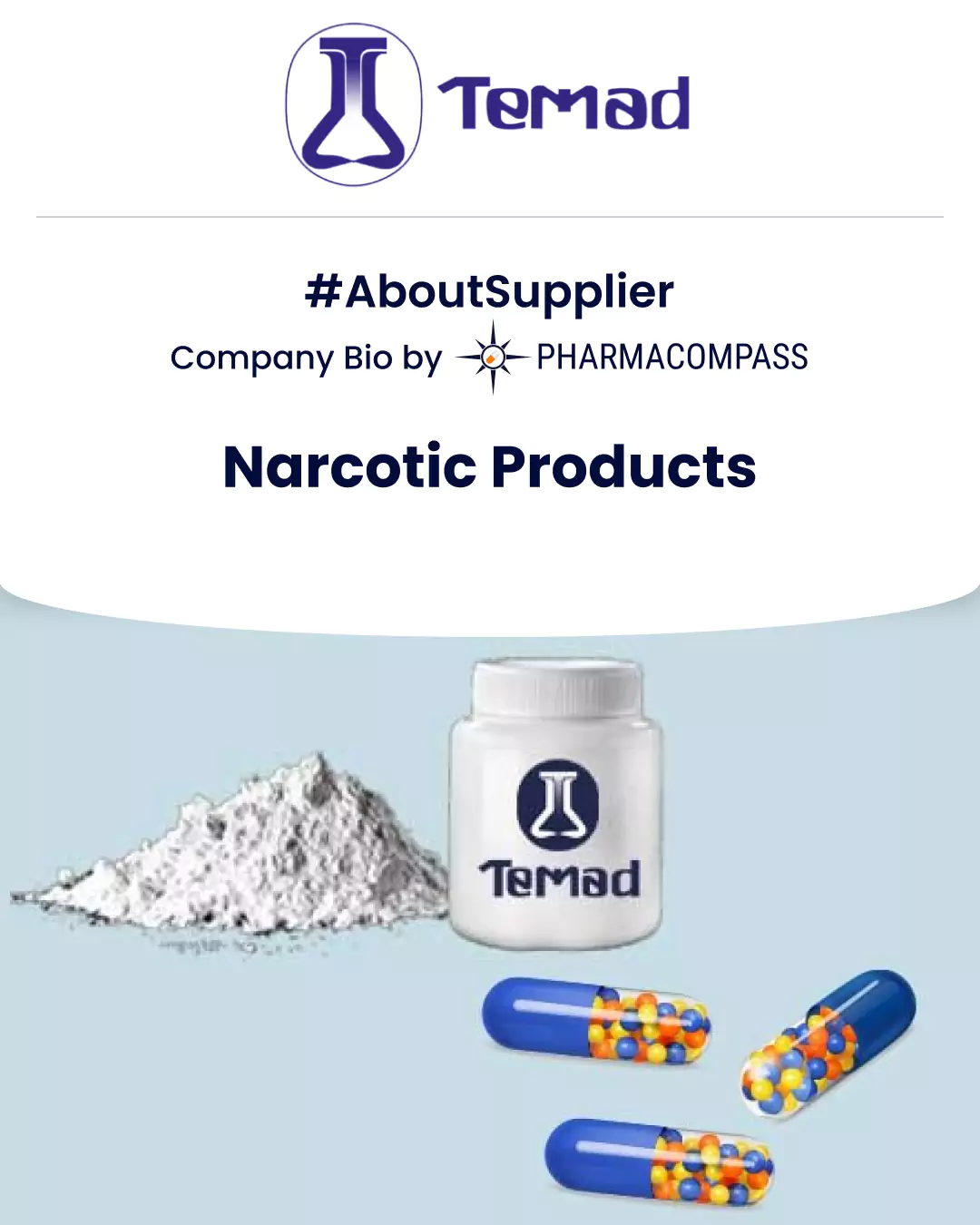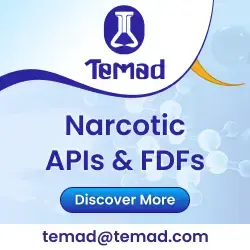
By PharmaCompass
2023-07-26
Impressions: 2107
View Temad's portfolio of Narcotic & Non-Narcotic APIs, Intermediates & Finished Products & explore Temad's manufacturing activities on PharmaCompass.
What are Narcotic APIs?
Narcotic API is an active substance which produces analgesia and narcosis (state of sleep). These APIs also provide addiction (physical dependance) and euphoria (pleasant effects) in certain people. Narcotics include various drugs, such as heroin, morphine, pethidine, etc., that cause numbness and stupor. In patients recovering from surgery or experiencing severe pain linked to cancer, narcotics are used to relieve moderate to severe pain, such as chronic headaches and backaches.
The government regulates the production, possession, and usage of narcotics since they can be abused or cause addiction (physical dependence on the drug). The control extends to the way they are produced, used, handled, stored, and distributed.
Narcotics are like opiates such as morphine and codeine, but are not made from opium. Opiates are compounds found in or derived from opium. Opium is made from the dried milky juice of the opium poppy (Papaver somniferum) seed pods.
Natural opioids include opium and its derivatives, heroin, morphine, and codeine. Semi-synthetic opioids, such as hydrocodone, oxycodone, hydromorphone, oxymorphone, and buprenorphine, are partially derived from opium and codeine.
Narcotics are attached to opioid receptors in the central nervous system (CNS). Apart from narcotics, controlled substances also include stimulants, depressants, hallucinogens, and anabolic steroids.
Narcotic drugs are classified into five Schedules under the Controlled Substances Act (CSA) 1970, depending on their medical usefulness, misuse potential, safety, and drug dependence profile.
What are the different challenges associated with manufacturing Narcotic APIs?
The demand for narcotic APIs has increased in recent years, and so have the challenges. Specialized expertise is required to navigate the stringent regulations surrounding narcotic APIs. The International Narcotics Control Board (INCB) regulates the production, distribution, import, and export of narcotics to reduce the risk of illegal use.
The various challenges associated with the manufacturing of narcotic APIs are listed below:
- Pharmaceutical companies must adhere to several security and laboratory controls, as well as very strict training with safety precautions, to ensure the safe handling of narcotic APIs throughout the manufacturing process.
The manufacturing of narcotic materials necessitates specialized handling procedures for receiving, transferring, packaging, and shipping.
- For the production of narcotic APIs, R&D laboratory control measures such as equipment cleaning validations at extremely low levels, adequately isolated and cleaned facilities, dedicated laboratory equipment, and keycard security systems are necessary.
- Special documents, including records for receipt, use, inventory, and managing expired narcotics, are required for the development and manufacturing of narcotic APIs.
- Handling narcotics requires skilled and trained professionals who must follow highly regimented safety protocols and PPE requirements. These professionals should be experienced in handling and working with controlled substances and hazardous materials.
As inadequate disposal leads to several detrimental health conditions, the manufacturing and disposal of narcotic APIs need to be carried out properly.
- Narcotic APIs require highly secure and controlled access to development and production suites, waste management systems and raw materials, as well as storage facilities.
Temad is a pioneer in producing high-quality narcotic and non-narcotic APIs (Active Pharmaceutical Ingredients) and FDFs (Finished Dosage Forms) in compliance with international standards.
What is Temad and what does it offer?
Temad Co (Tolid Mavade Avallieh Daroupakhsh), is one of the companies of Tamin Pharmaceutical Investment Company (TPICO) from SSIC SHASTA Group. Established in 1997, it is one of the largest APIs (Active Pharmaceutical Ingredients) producers in Iran.
Temad is an innovative manufacturer of narcotics and non-narcotic Active Pharmaceutical Ingredients (APIs) and semi-finished pellets in the Middle East. Temad started producing FDFs (Finished Dosage Forms) such as syrups, tablets, and capsules in 2017 with the aim of cornering a major share of the narcotics and non-narcotics market.
Temad sells its Finished Dosage Forms to domestic pharmaceutical companies and the Middle East, and it also exports 23 products to 45 countries across 5 continents. As a result, Temad has a strong international presence and plays an important role in supplying pharmaceutical materials and narcotics to global markets.
In 2017, Temad received license to produce FDFs (Finished Dosage Forms) in addition to the production of Active Pharmaceutical Ingredients (APIs), and began the production line of oral solutions (syrups). Today, Temad is licensed to produce methadone syrups and opium along with Guaicodin.
Temad is a leader in the production of the highest-quality narcotic and non-narcotic APIs (Active Pharmaceutical Ingredients) and FDFs (Finished Dosage Forms). The quality management system in Temad ensures that the quality of the products meets the needs of the customer and the community in accordance with the requirements of GLP, GDP, GSP and GMP.
Temad utilizes, maintains, and improves the integrated management system, including quality management systems ISO9001: 2015, environmental management systems ISO14001: 2015, ISO45001: 2018, and occupational health, safety, and environmental system OHSAS 18001: 2007.
What are the different pharmaceutical products offered by Temad?
Temad Co has 23 active production lines (12 lines at its Alborz site and 11 lines at its Mashhad site) and over 70 kinds of pharmaceutical products. The pharmaceutical products include narcotics, non-narcotics, LVHV, corton, injections, medicine for opioid dependency; Buprenorphine tablets (2 mg), Methadone tablets (20 and 40 mg), Methadone syrup, Opium syrup (1%), Guaicodin syrup and pellet products.
These products are controlled and evaluated according to GMP and WHO standards, as well as other international standards like USP, BP, EP, IP, and JP.
The various products offered by Temad are mentioned below:
Narcotic APIs: Temad offers various narcotic APIs including Codeine, Noscapine, Methadone, Buprenorphine, Morphine, Opium Tincture 1% & 2%, Oxycodone, Oxymorphone, Pholcodine, Papaverine, Naltrexone, Naloxone, Paracetamol Powder/DC, and Hydrocodone.
Finished Products: In 2017, Temad received a license to produce Finished Dosage Forms in addition to manufacturing APIs (Active Pharmaceutical Ingredients). It began work on the production line for oral solutions (syrup). Today, various oral dosage forms, such as Omeprazole 20 mg, Ciprofloxacin 500mg, Acetaminophen, Tramadol 100, etc. are produced by Temad.
Semi-finished Products: Temad offers lansoprazole pellets (8.5%), omeprazole pellets (8.5%), pantoprazole sodium pellets (15% and 20%) and esomeprazole pellets (22.5%).
Intermediates: Noroxymorphone powder is a best-selling pharmaceutical intermediate of Temad and is used for the treatment of pain and inflammation. Temad offers a total of 20 intermediates, including Norcodeine ethyl carbamate, Hydroxycodeinone, Normorphinone ethyl carbamate, 6-Acetyl dihydrocodeine, Thevinone, Norbuprenorphine, Thevinol, Buprenorphine base, etc.
The PharmaCompass Newsletter – Sign Up, Stay Ahead
Feedback, help us to improve. Click here
Image Credit : Biosynthesis, tech advancements by PharmaCompass license under CC BY 2.0
“ The article is based on the information available in public and which the author believes to be true. The author is not disseminating any information, which the author believes or knows, is confidential or in conflict with the privacy of any person. The views expressed or information supplied through this article is mere opinion and observation of the author. The author does not intend to defame, insult or, cause loss or damage to anyone, in any manner, through this article.”






